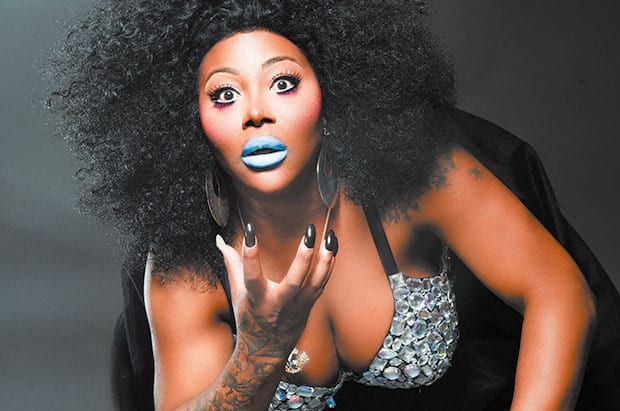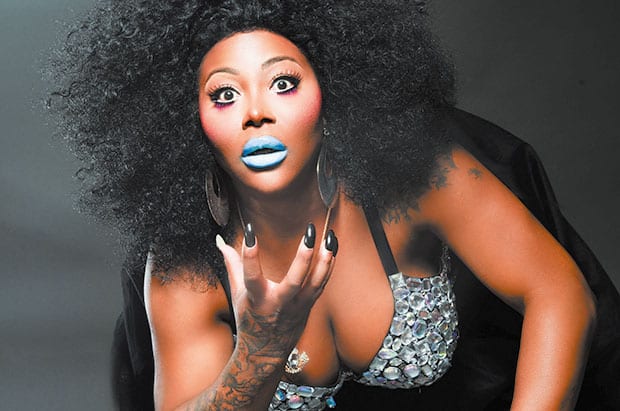The activist and performer takes pride in being black and trans … and will share that confidence at a gay Juneteenth celebration this weekend
TS Madison makes no apologies for being who she is … and feels most people shouldn’t, either. As an out, black trans woman who is upfront about her history as a sex worker, Madison has done what it takes to survive… and, finally, thrive.
The Miami native became an internet sensation with the popularity of her YouTube channel, in which she discussed transgender issues as well as working in “adult” industries. She parlayed her success as an entrepreneur into a brand that now encompasses hip-hop recordings, an autobiography, custom merchandise and personal appearances — including hosting and performing at Saturday’s Juneteenth Unity Pool Party and Concert, sponsored by Dallas Southern Pride.
We tracked down Madison (from filming with RuPaul, no less) to discuss being a multi-minority, how she is continually “transitioning” and what to expect from her North Texas appearance.
— Arnold Wayne Jones
Dallas Voice: When did you first suspect you were trans, and when was that in relation to knowing you were “different” — gay, bi, sexually ambiguous, etc.? TS Madison: Listen, I knew I was trans when I first learned about the concept, around 17. I felt like me my mama were like the same. I wanted to know men like she knew men. I wanted to feel sex and love the way a man would give himself to a woman. Not just sexually — physically, emotionally, spiritually. Life was derived in Africa and I believe that black women are mother-earth and the closest thing to god. We look to our mothers or other black women in reverence and we want emulate that. That was my story. I wanted to be revered as a powerful figure that could transform the world by just my very presence.
When did you transition?
People always ask me that. I think I never stopped
transitioning. We all as human are on a constant transition. You want to know when I decided to be who I am on the inside — that is the question that should be asked! It started at about 17. I said to myself, “Girl, when are you going to grasp your own happiness?” I think we transwomen spend most of our lives being who others tell us we are. But we have to decide, “I am going to live my happiness and worry about someone else’s happiness later.” At 17 [is when] I started to put myself first.
You include the letters TS in your name, which would seem to stand for “transsexual,” a word that is not preferred in the trans community. Is that a political statement in some way? How do you feel about the way trans people are discussed, especially in the black community?
I think that everyone has to respect everyone’s individuality. At one point, TS stood for transsexual. But now it’s a play on words for me — “tossed salad,” “too much stuff,” etc. I took that in as a part of my brand and built that. My mindset is why be natural when you can be supernatural. Everyone likes to blend in and I like to stand out. Trans has been seen as one voice, but we have to start treating transwomen like individuals. I am secure in who I am, I have been living in transition for more than 25 years. I know that going through this life is not easy, so I took what people tried to use against me and made my strength. Yes, TS Madison is a brand, but I am who I am. Just make sure the check clears!
Here’s an impossible question to answer, but I’ll ask it anyway: What do you find harder in society at large — being trans or being a person of color?
Ahhhh! I think being a trans person of color. I cannot separate those identities — I am one of both. When you combine the two it makes it even more crazy. There are trans white people who will never share their privilege with trans girls of color. When people look at what I have, they say, “Oh, she was a sex worker!” [in a judgmental way.] No, I’m not a sex worker; I’m a businesswoman. You put “black woman” and “sex worker” in the same sentence, and people look at it as bad. But they forget that lots of white transwomen did sex work and are called “models.” I have received the bad end of the stick because by being both, not just trans or
black. People need to understand that being a minority on both sides is extremely difficult. Sometimes I want to run to my black people about how I’m treated as a transwoman… but I’m not accepted. I try to run to my trans people about the way black people treat me… but they can’t relate. So the identities are inseparable. I am black and I am trans and I have received the good and bad on both ends of that.
What are your most concerning issues related to the LGBT and/or black communities?
For me, it’s survival. There are a lot of trans people out there that don’t have work, education or a place to stay. People want to talk down about sex workers, but what people don’t understand is that everything requires money and the opportunities are not always there for transwomen to get adequate [pay and benefits]. I don’t discourage girls from sex work because I’ve been there, but what I do is open up a class or workshop on how to take lemons and make lemonade. I want to create programs to teach girls how to sharpen their crafts and use those skills to built businesses and brands of their own. It takes skills to do some of the things we have to do survive. Honey, sex work is customer service; scamming is accounting, logistics, event planning and everything else! I just want to show them the right way to use their skills and create legit lifestyles for themselves and their families. It takes skills. We need these girls to be business owners, bank tellers, etc.
What do you consider your calling — musician, activist, entertainer, author, something else? What most defines your public life, what you want to be known for?
My calling is life coach. People who have watched me, watched me go from 0 to 60. You can listen to what someone has to say all day, but to watch someone live is another story, because you learn how they did it. People have been able to see me go from a crawl to a walk, honey — a strut, a sickening strut. I want to be an entertaining life coach.
What will you be doing at Juneteenth? How familiar are you with the historical significance of Juneteenth in Texas?
June is Pride month above all — that we have every right and responsibility to be proud of who we are, all
of who we are. I know that Juneteenth is also significant because of the notice of liberation to Texas slaves; it’s all about liberation, freedom — and, let me add, fun. And paying homage to people who fought and lost for us to have these days and times. I will be hosting Dallas Southern Pride’s Juneteenth Unity Festival and Concert, but throughout the day, I will be reminding people who and why we are celebrating. I will be encouraging people to live their most liberated life they can. I and will be turning the party up and out.
What is the message you most want to impress upon your fans … or even people who don’t know you?
I would like to leave the readers with this: You cannot look at your today and judge that as your tomorrow. There are a lot of people are looking at their “right now” and unable to see hope [for the future]. If I would have judged my “then” at the time, I would not see myself where I am now. I never thought I would be where I am today because I was stuck looking at where I was in life 10, 15 years ago. I had to let that go and imagine the life I wanted to live. That gave me the permission to start the journey of who I am today.
This article appeared in the Dallas Voice print edition June 16, 2017.













